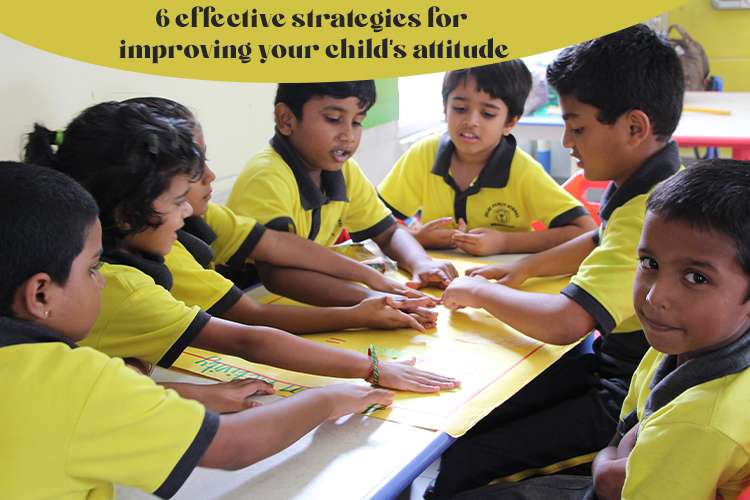It’s no secret that a positive approach is key to success in life. But what do you do when your kid’s approach is less than stellar? How do you fix a child’s attitude? As a parent or guardian our role is more of someone directing perspective than someone who’s an authority figure. The approach of a didactic authoritarian is not only outdated but is also ineffective with kids of today –who have a lot of information at their fingertips and have absolutely no qualms with calling anyone’s bluff when they see inconsistencies between your behaviour and communication. Simply said –they expect to walk the talk. To improve anyone’s behaviour, we need to get into the background and mindset of how and why people, including children, act the way they do.
Exploring the root cause of your kid’s mindset
Unpleasant manners may stem from various sources, such as school-related issues, home-life challenges, or even more serious concerns like depression or anxiety. Start by having an open conversation with the child, listening carefully without judgement. It’s also helpful to consult teachers or coaches for additional insights. Once the root cause is identified, work with the child to find solutions or seek professional help if necessary. Typically bad behaviour, tantrums and poor attitude are rooted in the atmosphere at home. Either they want attention, or affection, or they’re dealing with the outcome of some emotions that are not resolved properly. Understanding this from a point of empathy and problem solving goes a long way in helping the child.
Avoid negativity–look for the glass half full
To foster bright habits in children, parents must be inspiring role models and create a supportive environment. Of course, this doesn’t mean we should encourage toxic positivity. Avoid negativity in your interactions, refraining from constant complaints or irrational responses. Instead, focus on positive aspects of life and seek solutions to problems. As children develop their perspective, guiding them to see the bright side of people and situations. When addressing their unfavourable practice, engage in calm discussions rather than resorting to harsh punishments. Empower children to express themselves remarkably as they face life’s challenges.
Build a hopeful network around your child
Establishing a bright network around a child is crucial for improving their mind set. Identify inspiring role models within family, friends, or respected figures for them to look up to–it’s key that we look to people who come from different backgrounds so they may be exposed to perspectives. Engage actively in your minors activities, whether by volunteering at their school or participating in their extracurricular pursuits. This involvement provides opportunities to connect with other individuals who can influence the child favourably. For religious families, attending church or similar activities fosters a cheerful network and instils essential values. Encourage children to build friendships with peers who display kindness and respect while discouraging associations with those who exhibit bad conduct.
Modelling the desired action
Children can be challenging at times, but leading by example is a powerful way to address negative action. Display positivity and offer praise when they do good things. Respond calmly to their misconduct, explaining what went wrong and helping them find better ways to behave. Setting a successful example is a great method for encouraging children to adopt a sunny outlook on life.
Exploring your little one’s emotional world
When your young one’s mentality takes a sudden downturn, it could be influenced by various factors like stress or sadness. Engage in heartfelt conversations to understand their feelings. Let them know that their emotions matter, even if there is no full agreement. Help them discover healthy ways to cope with their emotions, whether through trusted adult discussions, journaling, or outdoor activities. Sometimes, setting clear boundaries can make them feel safe. If their mind is tied to inappropriate habits, calmly and firmly establish limits and consequences. As final point be their role model. Show them how to handle tough emotions in a healthy way. Let them see you express your feelings positively, and it can make a big difference.
Seeking professional assistants when needed
No parent ever wants to hear that their child has a problem. But when signs of struggle emerge, especially academically or socially, it may be time to seek a hand from an expert. If there is uncertainty about how to address a child’s negative outlook, start by discussing concerns with their teacher, who can provide insights into their minds and school performance. If necessary, consider consulting a specialist. When seeking professional assistance, do not delay; early intervention provides impressive results. Choose a qualified expert with whom you feel comfortable working, as your collaboration is crucial to the process. Be prepared to actively participate in your kid’s improvement, which may include attending therapy sessions and working on behavioural goals at home.
Seeking professional assistance can be a difficult decision, but it may be the best way to help a child overcome their challenges. If signs of struggle are observed, do not hesitate to seek support.
Transforming your little one’s mentality involves a combination of thoughtful strategies and ongoing support. Encouraging beneficial self-talk, finding the silver lining, and modelling optimism are like building blocks for a brighter mindset. Steering clear of negativity, rewarding remarkable deeds, and handling meltdowns with patience contribute to a harmonious family environment. Understanding the root causes of negativity through open communication is pivotal. By surrounding the child with bright influences, both in role models and friends, parents create a conducive atmosphere for development. Acting as nice role models, parents should embody the behaviour they wish to instil. Nurturing your baby’s emotional world, validating their feelings, and seeking professional assistance when needed are crucial steps in this journey. Ultimately, a parent’s steadfast commitment to fostering positivity can shape a child’s outlook, preparing them for a future filled with resilience, empathy, and joy.




